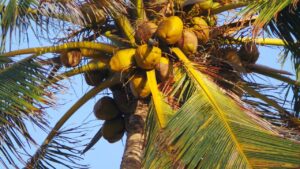 As you may have read before in this website, we chose not to use this ingredient, potassium cocoate, that is indeed very common in ecological detergents, in conventional ones and in many body cleansers. Is is often considered “safe” because of its natural origin; however, scientifically that is not true, as natural origin is not a guarantee of safety.
As you may have read before in this website, we chose not to use this ingredient, potassium cocoate, that is indeed very common in ecological detergents, in conventional ones and in many body cleansers. Is is often considered “safe” because of its natural origin; however, scientifically that is not true, as natural origin is not a guarantee of safety.
There are a lot of examples of natural substances showing high toxicity towards mammals and particularly human beings (hemlock, botulinus, aflatoxins, benzo-a-pyrene… and so on). Documented and confirmed toxicity of potassium cocoate, also named “coconut potassic soap”, occurs in mammals foetuses (teratogenicity); there are also suspicions about genetic toxicity towards immunitary human cells (lymphocites), although confirmations must be still achieved.
The good cleaning properties, as well as other useful features (antifoaming and thickening properties in detergents, soft and agreeable foam in soap bars) and low prices in the raw materials market, made this substance increasingly common, even in high concentration, in laundry detergents, washing-up liquids, floor cleaners and in soaps and soap bars for body cleansing. Some variants exist, as potassium babassuate (so called by the coconut subspecies) and potassium laurate (a more technical way to call it); all are referred to cocoate. Chemically speaking, it is the product of a reaction (“saponification”) between coconut oil and sodium hydroxide.
Good cleaning properties cannot justify using it, since reproductive toxicity is demonstrated and there are suspicions of genotoxicity. Therefore Bensos chose not to use it, replacing it with other ingredients mainly of natural origin and with good toxicological profile.



Leave a Reply